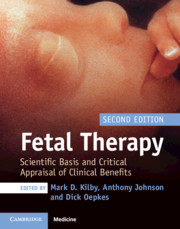Book contents
- Fetal Therapy
- Fetal Therapy
- Copyright page
- Dedication
- Contents
- Contributors
- Foreword
- Section 1: General Principles
- Chapter 1 The Rationale for Fetal Therapy
- Chapter 2 A Fetal Origin of Adult Disease
- Chapter 3 Human Embryology: Molecular Mechanisms of Embryonic Disease
- Chapter 4 Human Genetics and Fetal Disease: Assessment of the Fetal Genome
- Chapter 5 Interventions in Pregnancy to Reduce Risk of Stillbirth
- Chapter 6 Fetal Therapy Choices: Uncertain and Emotional Decisions and the Doctor’s Role in Parental Decision-Making
- Chapter 7 The Ethics of Consent for Fetal Therapy
- Chapter 8 Open Fetal Surgery: Is There Still a Role?
- Chapter 9 The Artificial Womb
- Section 2: Fetal Disease: Pathogenesis and Treatment
- Section III: The Future
- Index
- References
Chapter 2 - A Fetal Origin of Adult Disease
from Section 1: - General Principles
Published online by Cambridge University Press: 21 October 2019
- Fetal Therapy
- Fetal Therapy
- Copyright page
- Dedication
- Contents
- Contributors
- Foreword
- Section 1: General Principles
- Chapter 1 The Rationale for Fetal Therapy
- Chapter 2 A Fetal Origin of Adult Disease
- Chapter 3 Human Embryology: Molecular Mechanisms of Embryonic Disease
- Chapter 4 Human Genetics and Fetal Disease: Assessment of the Fetal Genome
- Chapter 5 Interventions in Pregnancy to Reduce Risk of Stillbirth
- Chapter 6 Fetal Therapy Choices: Uncertain and Emotional Decisions and the Doctor’s Role in Parental Decision-Making
- Chapter 7 The Ethics of Consent for Fetal Therapy
- Chapter 8 Open Fetal Surgery: Is There Still a Role?
- Chapter 9 The Artificial Womb
- Section 2: Fetal Disease: Pathogenesis and Treatment
- Section III: The Future
- Index
- References
Summary
There is a worldwide epidemic of non-communicable diseases (NCDs), including cardiovascular disease (CVD), type 2 diabetes, chronic lung disease, and some forms of cancer; predisposition to these is linked to obesity. This is despite efforts by individuals to modify their diet and lifestyle, and government and global programs aimed at promoting healthy eating or increased physical activity. Some initiatives have begun to target childhood eating and activity. But a strong and international body of scientific and epidemiological data suggests that health interventions should be focused on a much earlier period of development: pregnancy. Expectant couples are often focused on the immediate result of their pregnancy – a viable baby. It may come as a surprise to many of them to hear that the finer details of building a baby are in fact the foundation of lifelong health.
- Type
- Chapter
- Information
- Fetal TherapyScientific Basis and Critical Appraisal of Clinical Benefits, pp. 8 - 19Publisher: Cambridge University PressPrint publication year: 2020

